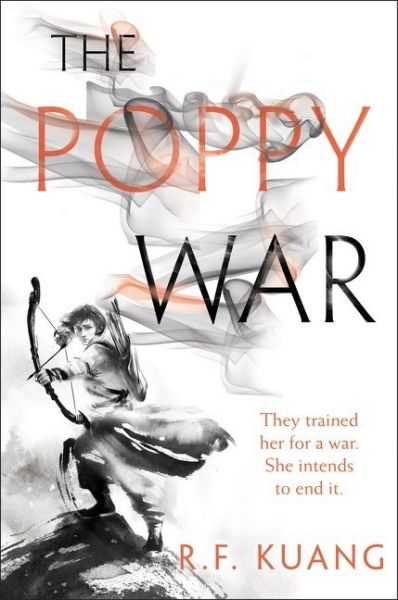The Black Wind Still Moans
The Poppy War (Poppy Wars, volume 1)
By R. F. Kuang

23 Jan, 2018
R. F. Kuang’s 2018 debut The Poppy War is the first volume in her secondary world Poppy Wars fantasy trilogy.
Faced with an arranged marriage to an odious merchant (plan A), Fang “Rin” Runin opts for plan B: pass the arduous Keju test, which will give her a place at the prestigious academy in Sinegard. The odds that a war orphan fostered to a family of no particular rank will pass the exam are poor, but nevertheless, she persists. The highly motivated Rin places first for the entire Rooster province.
She soon discovers that winning entrance at Sinegard is not at all the same thing being accepted there.
Spoilers.
The official line is that the exam is the first step to success in Nikan’s vast meritocracy. Anyone can enter! Anyone can succeed! In practice, most poor people lack the education and spare time to study for the Keju. A dark-skinned, lower class person like Rin, a person with a rustic accent even, soon discovers that the system has many ways of screening out those of low birth. Only those who are unusually smart and determined manage to avoid expulsion.
Rin’s academic career takes an unexpected detour when she allies with eccentric Lore Master Jiang. None of the students are certain what exactly Lore might be, although they can tell from the way that the other Masters treat Jiang that it is not held in high regard. Jiang’s unconventional ways include a willingness to accept Rin as a student. He alone sees her potential.
It takes Rin some time to realize that potential. Regarded as rank superstition by most, Lore is actually a repository of shamanic methods that actually work. They are, however, both powerful and dangerous. Not well suited for mass education. Few who embrace Lore end well. Rin may be one of the few.
Now to look at the larger picture. The Federation of Mugen is powerful, populous, and cramped on its home islands. Its rulers covet the Empire’s lands. A previous attempt by Mugen to annex Nikan’s territories failed only because western power Hesperia intervened. When a new emperor takes the throne in Mugen, he orders a new invasion. Nikan’s lands will be Mugen’s and Nikan’s people will be wiped from the face of the world.
Nikan cannot win if it plays by the rules of conventional warfare. Only unconventional means can save the mainlanders … unconventional means like Lore, wielded by a dark-skinned person of lower rank. Rin can end the Mugen threat. But will she be willing to pay the price? Will she be able to live with the results?
~oOo~
Nikan is a simplified China, its Red Emperor analogous to Qin Shi Huang. Like the Qin Dynasty, the Red Emperor’s Dynasty was short lived but his empire proved durable, if somewhat tumultuous: it was too large to easily conquer but also too large to easily rule.
Kuang has also chosen to lift plot elements from the Century of National Humiliation, when Western powers and a modernizing Japan attempted to carve up or conquer China. She has relegated the Western powers to a back burner; in this book, Nikan’s enemy, Mugen, is a stand-in for Japan. Although the title of the novel recalls the Opium Wars, the events of the book riff on the Second Sino-Japanese War, a conflict in which the Japanese murdered a Hiroshima’s worth of Chinese people every two weeks for almost a decade. Mugen is as enthusiastically homicidal as Imperial Japan
Which brings me to a rape and violence warning. This book requires one but not for the usual “enough rapes make dragons realistic” nonsense. The author draws on events like the Battle of Shanghai and the Nanking Massacre for inspiration. All of Mugen’s brutality and viciousness is drawn from real-world events. Many readers may find these elements off-putting, but it’s hard to portray gleeful rape, torture, genocide, and worse in a tasteful manner.
Rin begins as a fairly standard plucky woman protagonist, struggling against an unjust social system that is determined to consign her to some dismal role. By the end of the book, she has become a monster. Mugen gives her the choice between becoming a monster or becoming one of all of too many victims. She chooses to be a monster.
This is yet another SFF novel in which the final solution is a Final Solution. Not the sort of thing I like. In this case, I found it hard to have much sympathy for any genocidal nation that finds itself on the receiving end of its own policies. And yet … even though Rin is convinced her that her actions were completely justified, some of the other characters (the handful who make it to the end of the book) are doubtful that this was the best course of action.
This is the first volume in a trilogy; the other two will no doubt explore the consequences of Rin’s decisions.
Engaging but horrifying, The Poppy War is available here (Amazon) and here (Chapters-Indigo).
